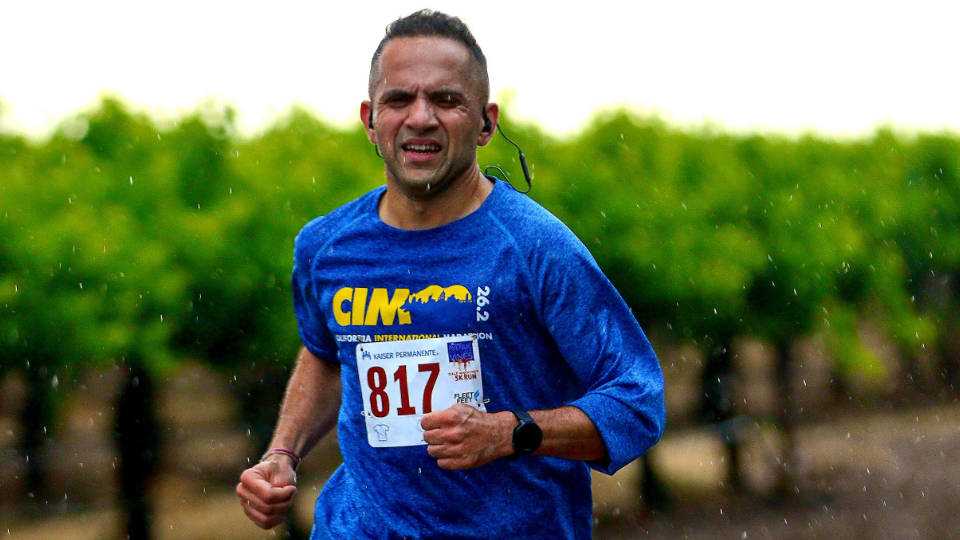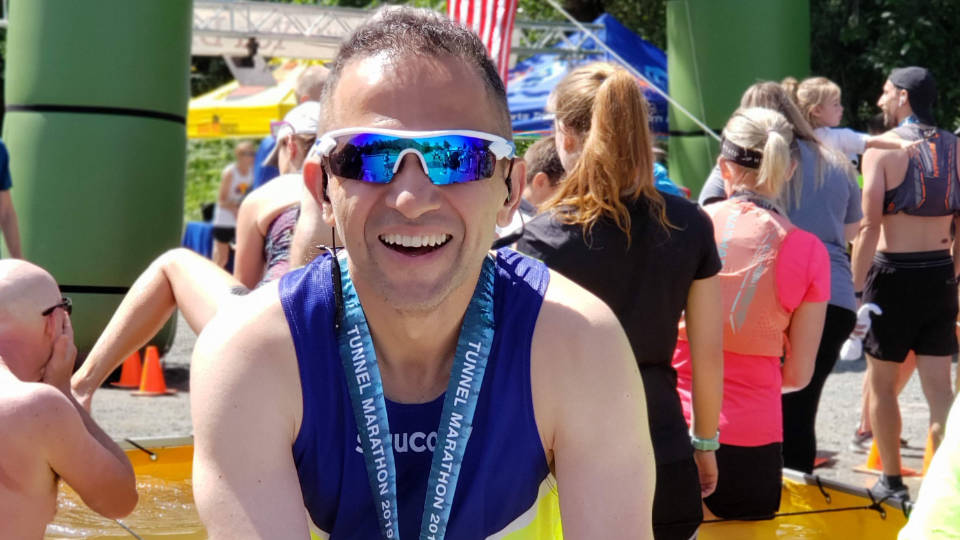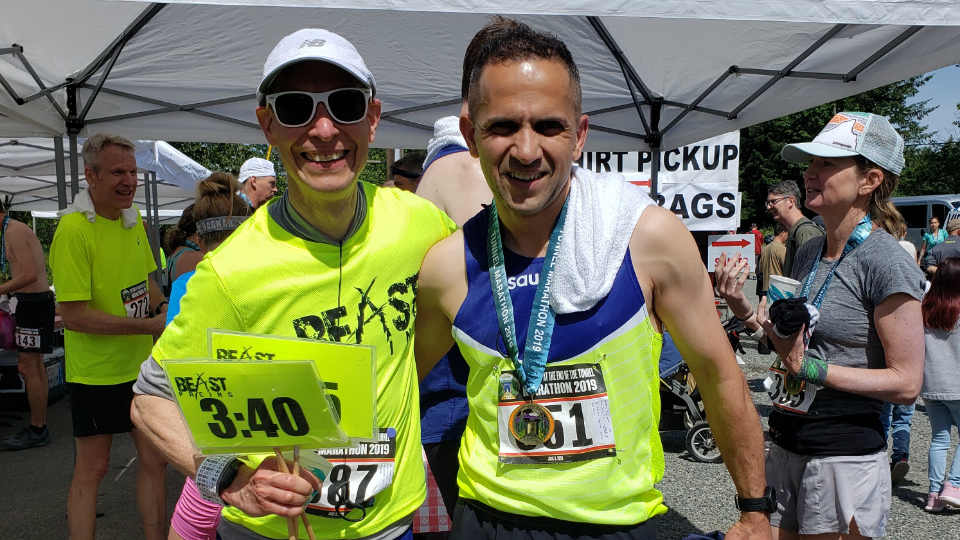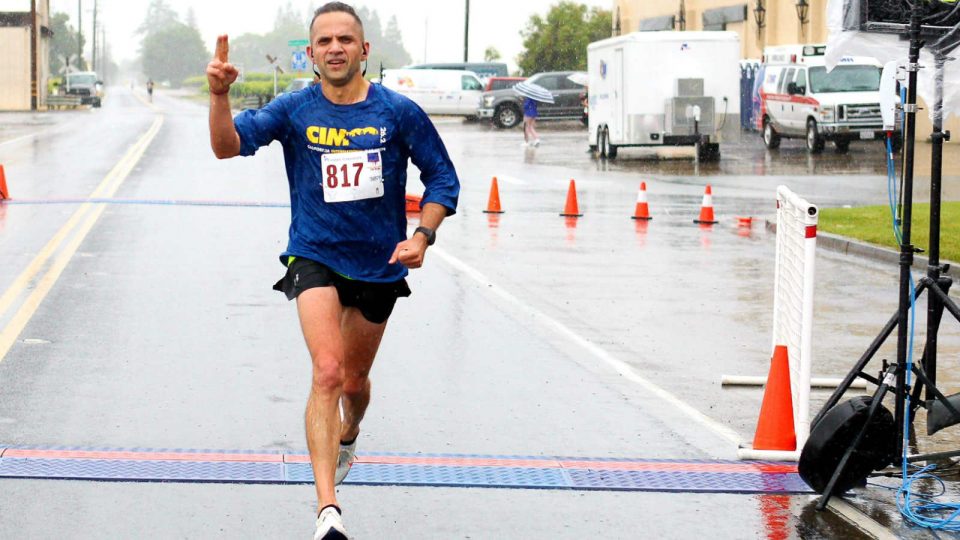Training for a marathon is a love hate relationship. People often see that running looks may easy and effortless, but what people don’t see is how much effort and sacrifice that runners put it in their day-to-day training.
It’s both physically and mentally hard to run a marathon without adequate training. At RunSociety, we always respected a runner when he/she completes a marathon no matter what the timing was.
For most marathoners, the Boston Marathon is one of the must do marathons in their bucket list, but the tickets into the world’s most famous marathon is harder to come by.
Working as a technology industry professional based in Silicon Valley, California, 45 year-old Tajinder Maan, recently got qualified to run in Boston Marathon 2020.
To be able to run in one of the marathon major events like the Boston Marathon is not a ‘piece of cake’ task.
Knowing it will be a challenging task, TJ trained for the Boston Marathon 2020 with perseverance, dedication and patience.
His hard work has paid off over a year with many ups and down and he would like to share his story to inspire runners not to give up on their running journey.
TJ has a lot to share on how he train for the Boston Marathon 2020. But first, let’s understand more about the Boston Marathon and why it’s the dream for so many runners in the world.
You can do goal setting with a pencil, but you have to do goal getting with your legs. You have to take action.
What is the Boston Marathon?
The B.A.A has organised the Boston Marathon when the event started in 1897 which make the Boston marathon the world’s oldest annual marathon. It ranks as one of the world’s most prestigious road racing events as well as one of the world’s most challenging races. It is always held on the third Monday of April.
The Boston Marathon is also an IAAF Gold Label road race and is one of six World Marathon Majors.
The success that distinguished the Boston Marathon among other marathons is the virtue of its traditions, longevity, and method of gaining entry into the race (via qualification).
How to Qualify for the Boston Marathon
You will need to be at least 18 years old at the time of the marathon to participate in the Boston Marathon. You’ll also need to race in a certified marathon within a year of the Boston Marathon and submit your qualify race and time (chip time). Meeting your age group’s qualifying time doesn’t guarantee you a slot in the Boston Marathon, but it does allow you to submit.
Since the Boston Marathon is an extremely popular race, it received hundred and thousands of submissions every year. When the total number of submissions is more than the allotted field size for qualified athletes, then the fastest among the pool of applicants in their age and gender group will be accepted.
For the Boston Marathon 2021, qualifying times must be run on or after Saturday, 14 September 2019.
Road to Qualifying For The Boston Marathon 2020
RS: When did you get inspired to include running in your daily life?
TJ: I have run since high school, but turned out to be more active running since 2015. After running a half marathon and placing well in that race.
Running now is like a daily vitamin to me, I feel energised and revitalised after my runs. I travel a lot and take my running shoes with me wherever I go. Many times I will skip breakfast in the morning (for an energy bar) but I have rarely gone more than 2 days without a run. There is nothing quite like running.

RS: What got you interested in running the Boston Marathon?
TJ: The Boston Marathon is one of the 6 marathon majors and the oldest, most prestigious road race in the world.
The frenzy of runners, who try to qualify for the tough Boston Marathon standards each year is unmatched. It is very exciting to be part of something like that.
RS: You mentioned that your long distance runs were the most painful part of the training. Can you describe why?
TJ: Running 20 miles every weekend is painful, it’s like running a half marathon plus each week.
To be honest, the hard part is lacing up and getting out. The after run feeling is actually pretty awesome. Also, I was in intense training, so I was feeling the pressure which can make it seem hard.
My favourite trail has a 1 mile loop that I stuck to for my long runs. Running for 3 hours repeatedly around a loop can be very boring. Post my BQ I actually enjoy exploring new trails and running for fun.
RS: How do you plan and train for your Boston Marathon 2020?
TJ: I have a template that works for me. I follow a plan that mixed one long run, a tempo run and an interval session each week. My weekly mileage is between 25-30 miles when I am training.
I don’t believe in high mileage training plans as they lead to injuries and anything over 25-30 miles each week is unnecessary.
On non running days, I do core exercises that include indoor biking, multiple 2 minute planks, crunches, push ups and etc. I had found mountain climbers and planks to be the best exercises for core strengthening.
I often do breathing exercises like Pranayam, they help expand the lung capacity and boost VO2 max levels.
Pranayam is also a great way to get started with meditation that has many positive benefits to your overall physical and mental well being.

Outside of family and work, qualifying for Boston is probably the biggest accomplishment of my life!
RS: Do you face any obstacles during your training for your qualifying Marathons?
TJ: One of the hardest things with marathon training is to get into a training rhythm. Once you get past the first 1-2 weeks, things will get a lot easier. My work requires me to travel quite a bit, so finding time to complete a 6 miler during travel can be a challenge.
I tend to plan my runs so that during my travel days I am cross training which can be done in a hotel room, gym or even a stairwell, running stairs is actually a great exercise.
The other thing which a lot of people tend to think about runners is diet and the whole idea of eating right, not drinking too much and etc.
For me, I generally tend to eat healthy so it’s never been a problem. But I also think it’s not a big issue in the overall scheme of things.
Once you get into running consistently, the diet part almost always self-corrects and you automatically start eating right without even trying.
RS: What have you learned throughout the training? Why?
TJ: One of my favourite quotes is “You can do goal setting with a pencil, but you have to do goal getting with your legs. You have to take action”.
It’s important to get out of that “planning mode” and get started with some short runs. What seems very hard at first is often not that hard.
It’s just your mind playing tricks. Once you commit, you will enjoy it so much that it starts a positive spiral which can be quite amazing.
RS: During your training, what keeps you going through those difficult moments?
TJ: You have to realise it’s a long game and you can’t let short term issues derail you. If you stick to the plan the difficulties will eventually resolve themselves.

RS: What was the feeling like when you got accepted into the 2020 Boston Marathon?
TJ: Like nothing else. Outside family and work – the greatest accomplishment of my life!
RS: What is the best piece of advice you could give to runners out there if they want to run in the Boston Marathon 2020?
TJ: Pick a marathon training plan that works for you then stick with it. Don’t overthink the process, the gear or even getting a coach and etc.
You were born to run, so just start running and gradually build up the mileage. Focus on the long runs – they are the most important part of your training.
You have to be able to run 2-3 hours once a week. The best way to build up to the long runs is to slow down. Your long run pace should be at least 2-3 minutes slower than your 5K pace.
Once you slow down, they will become a lot easier.
What is the Motivation for Running a Marathon?
The road to a marathon isn’t a bed of roses, with blood, sweats, and tears put into the training. The motivation characteristics for completing a marathon differ from one another.
For the most experienced runners, social and competitive reinforcements motivates them more than personal accomplishment or internal psychological rejuvenation.
The mid-level runners were primarily motivated by personal performance enhancement and psychological rewards.
For the rookie runners, the more important motivation seems to be self-esteem since they are less concerned with performance improvement as they have yet to realise their marathon goal accomplishment.
As TJ noted, “Our biggest problems and our greatest challenges are all inside us – running a marathon helped me find some of them.” You can read more about his quest to qualify for the Boston Marathon at his blog.
What will be your motivation to run a marathon? Let us know in the comments.





